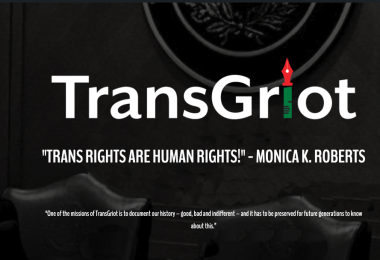Introduction from Managing Editor V. Jo Hsu
Earlier this year, an editor for a major news publication rejected one of my drafts with the comment: “Actions are criminalized, people aren’t.”
It was around February 2022, after Texas Gov. Greg Abbott instructed Child Protective Services (CPS) to investigate parents of trans children for “child abuse.” Referencing Dorothy Roberts’s research, I explained that the child welfare system criminalizes Black people and that Abbott’s directive would lead to the further endangerment, separation, and persecution of Black families.
Not that I care much for grammar policing, but the Oxford English Dictionary agrees that people can be criminalized, providing as its first definition:
1. To turn (a person) into a criminal, esp. by making his or her activities illegal.
Oxford English Dictionary Online
Regardless of language rules, however, the editor missed my point (and I had failed to convey it to her). Despite conventional thought, white supremacy criminalizes people. In the US, Black students compose 31% of public school-related arrests despite being only 16% of the enrollment. Black students are suspended or expelled at three times the rate of white students, and also three times more likely to fall back into the juvenile justice system the following year.
As I hope would be obvious to readers, these statistics are not due to any unique actions taken by Black students– they are because the same actions that are often innocuous for white youth are treated as criminal when enacted by Black children.
Similarly, much of the recent legislation works to criminalize perfectly mundane behavior if it is undertaken by trans or queer people and/or people of color. In Florida, teachers have been instructed to remove photos of same-sex spouses from their classroom, even though photos of heterosexual families remain acceptable.
By accusing LGBTQ folks of being “groomers,” conservatives are attempting to link all trans and queer people to criminality. @libsoftiktok, the influential Twitter account that doxxes LGBTQ teachers and administrators, frequently shares otherwise mundane images of LGBTQ-inclusive language or material. These posts do not need to provide any explicit argument, assuming (unfortunately correctly) that readers will interpret anything queer or trans as inherently perverse.
When the account shares stories of trans and queer teachers simply identifying as trans and queer in front of their students, the comments fill with accusations of “grooming,” calls for firing the teacher and school board, and calls for arrest.
This outrage is not about any particular action; it is about portraying LGBTQ people as inherently persecutable.
I tried explaining this to the editor, who dismissed my every idea as “too complicated.” Though I was allowed only 800 words for the article, she wanted me to define fairly common words like “cisgender.” In her feedback, she asked that I provide further evidence of transphobic attacks and expressed confusion at the remark that Black and trans communities are not independent of each other– i.e. that Black trans people exist.
The editor was, like most editors in the United States, cisgender, white, and heterosexual. She may also be correct that most readers may require a definition of “cisgender” or may live in such a way as to not understand that people are criminalized for who they are.
By the time I added all the definitions and explanations she needed, however, I had no more room for a substantive argument. I had spent too many of my allotted 800 words asking my audience to see beyond a sharply divided gender dichotomy and begging readers to care for trans lives. There is something uneven about requiring these explanations in a generalist publication that references Christian liturgy and sacrament without definition, assuming and perpetuating a particular readership.
This is how cisgender “innocence” stifles trans voices.
It forces us to start every conversation arguing for what is freely granted to others: the understanding that trans people’s self-understandings are valid, and that we deserve access to health care and employment and community. We replay the same tired conversations about how pronouns work, why trans people are far more likely to be assaulted in public bathrooms than to perpetrate assault, and how many major medical organizations support gender-affirming care.
I’m tired of reiterating that puberty blockers have been prescribed to cisgender children for decades. I’m tired of explaining that forcing an adolescent through an unwanted puberty, too, is a choice– that withholding treatment is not a neutral action, but an endorsement of harm. I want to write from a place where our dignity is not up for debate– where our lives, our self-knowledge, and our creative potential are a given. I want to have conversations about how many trans people still struggle to access health care, safety, and shelter, even before the newly restrictive legislation. I want to talk about how medical models still enforce cisnormative, white middle-class expectations for gender, and about how we pursue futures that address the needs of all trans people.
Transgender identity, for me– despite all the transphobia– is rooted in hope. So many of us have to dream up and then build the lives we are denied. And, despite everything, we achieve the so-called impossible. I am, through the love of beautiful, generous communities, living an adult life I could never have imagined.
I suppose this is where I should introduce myself: I am a professor of Rhetoric & Writing, LGBTQ studies, and Asian American Studies at the University of Texas at Austin. I’m also first and foremost a writer– rather, a storyteller. Stories are how I’ve always made sense of the world and how I find and forge connections with others. Right now, trans people– trans POC in particular– need more opportunities to tell our stories, to hear one another’s, and to build lasting relations that will carry us through so much racist and transphobic hostility.
Despite this year’s onslaught of anti-trans legislation, mainstream media has remained largely silent on the topic, leaving Fox News to shape much of public understanding about trans people. When other outlets have covered the laws that limit our lives and life chances, they’ve often failed to speak with actual trans people. Throughout the record-breaking numbers of anti-trans murders in 2021, mainstream news spent a total of 43 minutes in the entire year covering these attacks.
Monica Roberts said it best: “We must take the lead in writing, producing and telling our own stories.” When Dee Dee Watters invited me to join TransGriot, I could not say yes quickly enough. The original TransGriot gave me a glimpse of what trans creativity and community could look like– long before I felt safe and strong enough to say I was trans.
I am excited to see what we – the trans inheritors of the world Monica made possible– can do with the platforms and communities that she built. I hope to hear from writers and readers across a vast spectrum of experiences. I hope we connect to and listen and learn from one another.
It’s not that I won’t do “Trans 101,” anymore or that I won’t write to cis audiences. This explanatory work is important, particularly given the minimal coverage that mainstream media has given to trans voices. If, however, every time we talk about trans issues, we have to define gender, have to justify our experiences, have to explain– again– the validity of our identities and our deservingness of care, we will never have the space and time to articulate, let alone build, a world where we are genuinely free.
I want spaces where the complexity and richness of our experiences and ideas can be honored. I want to amplify the diversity of voices among us and write to and with communities interested in the hard work of witnessing “complicated” experiences. I cannot wait to meet more of you, to listen to your stories, and to discover how we, as a trans community, can better care for one another and for the futures we need to flourish.







